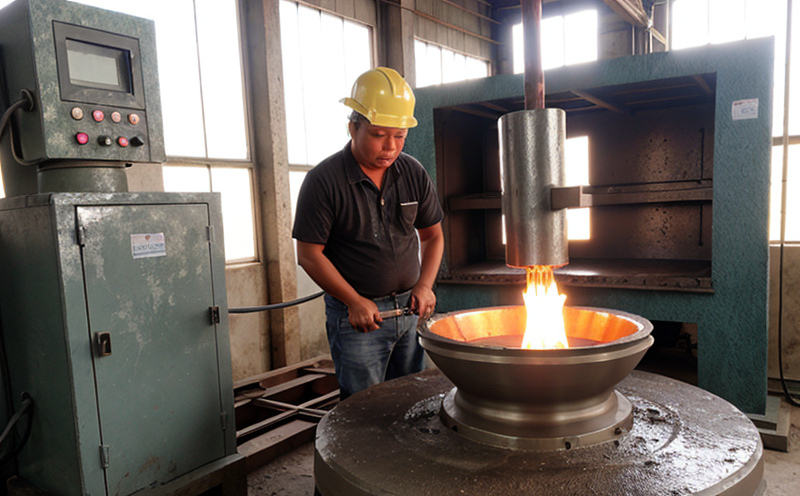ISO 8062 Geometrical Tolerance Testing of Castings
The ISO 8062 standard provides a comprehensive framework to evaluate geometrical tolerances in castings. This service is essential for ensuring that parts and components meet precise dimensional requirements, which are critical for the industrial manufacturing sector. In casting processes, achieving accurate geometrical tolerances can significantly impact the performance, durability, and functionality of manufactured products.
Geometrical tolerance refers to the permissible variation in the shape, size, or position of features on a part. These tolerances are defined by standards such as ISO 8062, which specify how to interpret geometric parameters for engineering drawings. Understanding these parameters is crucial for quality control and compliance with international regulations.
In industrial manufacturing, especially within casting and foundry processes, precise geometrical tolerances ensure that parts fit together correctly, operate efficiently, and maintain their intended performance over time. This service supports industries such as automotive, aerospace, and construction by guaranteeing product reliability and safety.
The testing process involves several key steps: preparation of the casting sample, measurement using appropriate instruments, interpretation of results against ISO 8062 guidelines, and reporting findings to relevant stakeholders. The accuracy and precision of these measurements are critical for ensuring that parts meet the required standards.
ISO 8062 testing is conducted in a controlled environment with state-of-the-art equipment tailored to measure various geometrical parameters accurately. This includes using coordinate measuring machines (CMMs) and other specialized tools designed to capture even minute variations within specified tolerances.
The importance of this service cannot be overstated, as it directly influences the quality assurance processes across multiple sectors. By adhering strictly to ISO 8062 standards, manufacturers can enhance their reputation for delivering high-quality products that meet stringent international requirements.
Understanding the nuances of ISO 8062 is essential not only for maintaining compliance but also for optimizing production methods and improving overall product performance. This service ensures that every aspect of the casting process adheres to global best practices, thereby contributing to safer, more reliable end products.
Scope and Methodology
The ISO 8062 standard defines a systematic approach to assessing geometrical tolerances in castings. It covers various aspects including the interpretation of geometric parameters on engineering drawings, the use of appropriate measuring techniques, and the establishment of acceptance criteria based on these measurements.
- Geometric Parameters: These include features such as straightness, flatness, roundness, cylindricity, and others that define how precisely a part can be manufactured.
- Measuring Techniques: Methods used to measure these parameters accurately. This includes but is not limited to using CMMs, micrometers, and other precision instruments suitable for capturing minute variations within specified tolerances.
- Acceptance Criteria: Guidelines that specify the permissible limits for deviations from ideal geometrical shapes as defined by ISO 8062. These criteria are critical for determining whether a casting meets required standards.
The methodology outlined in ISO 8062 ensures consistency and accuracy in testing, allowing manufacturers to verify compliance with international standards confidently. This process involves meticulous preparation of the sample, precise measurement using advanced equipment, thorough analysis, and detailed reporting to stakeholders.
By adhering strictly to this standard, we provide clients with reliable data that can be used for continuous improvement initiatives aimed at enhancing product quality and meeting regulatory requirements effectively.
Quality and Reliability Assurance
Ensuring the highest level of quality and reliability in manufactured parts is paramount, especially when dealing with complex geometrical tolerances. Our ISO 8062 testing service plays a vital role in achieving this goal by providing precise measurements that help maintain consistent performance across all stages of production.
Achieving compliance with ISO 8062 standards involves several key steps:
- Preparation: Ensuring the casting sample is in optimal condition for accurate measurement.
- Measurement: Using sophisticated equipment to capture precise data points.
- Analysis: Interpreting the collected data against ISO 8062 guidelines to determine adherence to specified tolerances.
- Reporting: Providing detailed reports that outline findings and recommendations for improvement.
This comprehensive approach not only ensures compliance with international standards but also facilitates ongoing improvements in manufacturing processes. By leveraging advanced testing methods, we help our clients maintain the highest levels of quality assurance and reliability across their operations.
The rigorous nature of this service underscores its importance in maintaining a strong reputation for delivering products that meet or exceed global expectations. Through meticulous adherence to ISO 8062 guidelines, we contribute significantly to enhancing product performance and safety standards worldwide.
International Acceptance and Recognition
The ISO 8062 standard is widely recognized and accepted across numerous industries globally. Its broad applicability makes it an essential tool for manufacturers seeking to ensure their products meet international standards.
- Aerospace: Ensures parts fit together correctly in aircraft manufacturing, enhancing safety and performance.
- Automotive: Guarantees that components function seamlessly within vehicles, ensuring reliability and longevity.
- Construction: Helps build structures with precision, contributing to safer and more durable construction projects.
By adhering to ISO 8062 guidelines during the casting process, manufacturers can ensure their products are not only compliant but also of superior quality. This standard is particularly valuable for companies involved in international trade or those operating within regulated environments where strict adherence to global standards is mandatory.
The widespread acceptance and recognition of this standard contribute significantly to its effectiveness as a tool for quality assurance. Its universal applicability ensures that products manufactured according to ISO 8062 are compatible with international requirements, facilitating smoother business operations worldwide.





